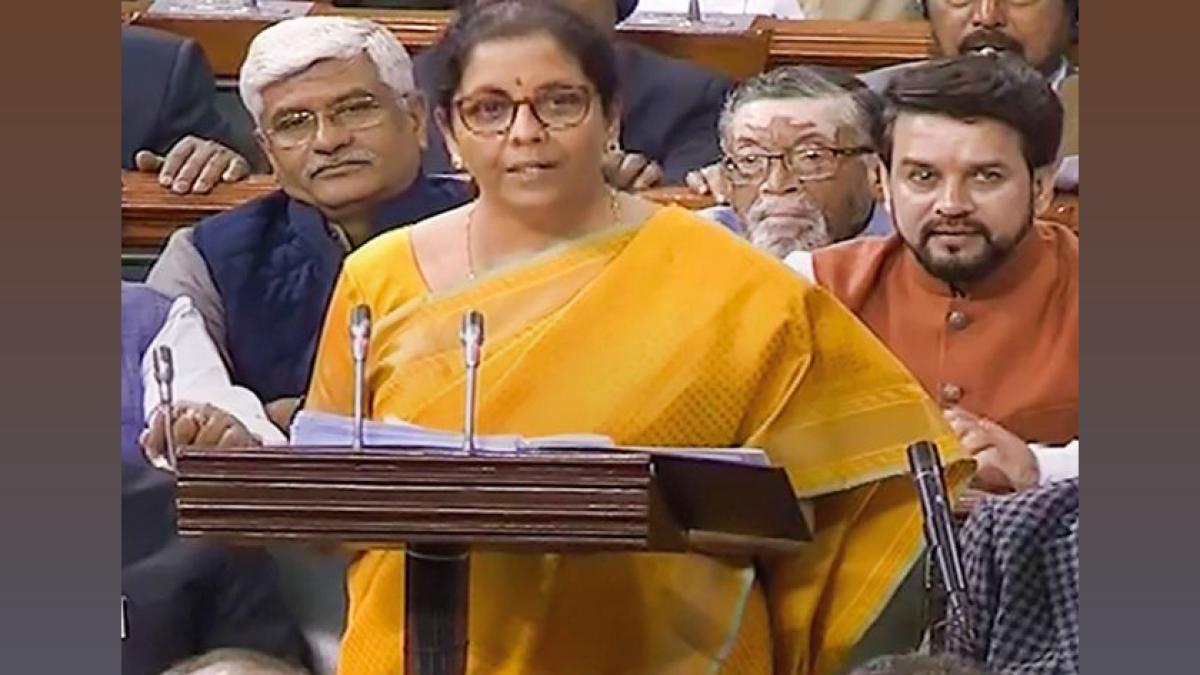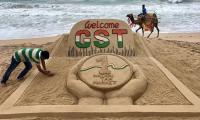Lok Sabha Passes Bill to Cap GSTAT Prez, Members Age
Lok Sabha passed two bills, one capping the age limit for GSTAT President and members and the other giving immediate effect to Budget changes in customs and excise duties.

New Delhi, Dec 19 (PTI) The Lok Sabha on Tuesday passed two bills -- one seeks to cap the age limit for GSTAT President and members while the other for giving immediate effect to the changes in customs and excise duties announced in the Budget.
With most of the opposition members under suspension from the Lok Sabha for unruly behaviour, the bills -- The Central Goods and Services Tax (Second Amendment) Bill, 2023, and the Provisional Collection of Taxes Bill, 2023, -- piloted by Finance Minister Nirmala Sitharaman were passed by voice vote after a short debate.
The Central Goods and Services Tax (Second Amendment) Bill, 2023, seeks to cap the age for president and members of the GST appellate tribunals (GSTAT) at 70 years and 67 years respectively, higher than 67 years and 65 years specified earlier
The Bill also aligns the provisions of the Central GST Act in line with the Tribunal Reforms Act, 2021.
As per the bill, an advocate with 10 years of 'substantial experience' in litigation in matters relating to indirect taxes in the Appellate Tribunal, would be eligible to be appointed as a judicial member of the GSTAT.
"Once the House passes the amendment bill, the process of selection of President and members of GSTAT would be initiated. CJI has already consented to chair the search and selection committee and has nominated senior judge Justice Sanjiv Khanna to chair the search cum selection committee for selection of judicial members and member technical (Centre)," Sitharaman said.
GSTAT will have one principal bench based in New Delhi, with a President and one judicial and technical member each.
The state benches of GSTAT will have a president and two judicial members and two technical members (one each from Centre and states).
Setting up of state-level benches of GSTAT would help businesses by way of faster dispute resolution.
Currently, taxpayers aggrieved with the ruling of tax authorities are required to move to the respective High Courts. The resolution process takes longer time as High Courts are already burdened with a backlog of cases and do not have a specialised bench to deal with GST cases.
Sitharaman said taxpayers who are litigating against GST demands in various high courts or the Supreme Court will have the liberty to withdraw their cases and approach GSTAT once the benches start functioning.
In September, the Finance Ministry notified 31 benches of the GST Appellate Tribunal (GSTAT), which will be set up in 28 states and 8 UTs.
As per the notification, Gujarat and UTs -- Dadra and Nagar Haveli, and Daman and Diu -- will have two benches of the GSTAT; Goa and Maharashtra together will have three benches.
Karnataka and Rajasthan will have two benches each, while Uttar Pradesh will have three benches.
West Bengal, Sikkim, Andaman and Nicobar Islands; Tamil Nadu and Puducherry will together have two GSTAT benches each, while Kerala and Lakshadweep will have one bench each.
The seven northeastern states -- Arunachal Pradesh, Assam, Manipur, Meghalaya, Mizoram, Nagaland and Tripura -- will have one bench.
All other states will have one bench of the GSTAT.
The Provisional Collection of Taxes Bill 2023, which was passed by the Lok Sabha, will give immediate effect to the changes in customs and excise duties announced in the Budget.
Moving the Bill for passage, Sitharaman said, the Bill seeks to obtain the authority from Parliament to provisionally levy and collect the newly imposed or increased duties of customs and excise for 75 days.
While the changes in rates of income and corporate taxes, incorporated in the Budget announced on February 1, are effective from April 1 or a notified date, most of the changes in customs and excise duty rates become effective from midnight.
This Bill proposes to replace the erstwhile Provisional Collection of Taxes Act, 1931 with a minor change that is technical in nature.
The provisions of the Bill empower collection provisionally, during the period between the introduction and enactment of the Bill the increased customs or central excise duty where such duty rate is increased beyond the statutory rate approved by Parliament or where such duty is newly imposed, she said.
The Bill provides for the "immediate effect for a limited period" of provisions in Bills relating to the imposition or increase of duties of customs or excise.
"By invoking this particular Act, we are able to temporarily ensure, till the time the Finance Bill gets passed, no speculative activities are happening," she had said while introducing the Bill in Lok Sabha last week.
With most of the opposition members under suspension from the Lok Sabha for unruly behaviour, the bills -- The Central Goods and Services Tax (Second Amendment) Bill, 2023, and the Provisional Collection of Taxes Bill, 2023, -- piloted by Finance Minister Nirmala Sitharaman were passed by voice vote after a short debate.
The Central Goods and Services Tax (Second Amendment) Bill, 2023, seeks to cap the age for president and members of the GST appellate tribunals (GSTAT) at 70 years and 67 years respectively, higher than 67 years and 65 years specified earlier
The Bill also aligns the provisions of the Central GST Act in line with the Tribunal Reforms Act, 2021.
As per the bill, an advocate with 10 years of 'substantial experience' in litigation in matters relating to indirect taxes in the Appellate Tribunal, would be eligible to be appointed as a judicial member of the GSTAT.
"Once the House passes the amendment bill, the process of selection of President and members of GSTAT would be initiated. CJI has already consented to chair the search and selection committee and has nominated senior judge Justice Sanjiv Khanna to chair the search cum selection committee for selection of judicial members and member technical (Centre)," Sitharaman said.
GSTAT will have one principal bench based in New Delhi, with a President and one judicial and technical member each.
The state benches of GSTAT will have a president and two judicial members and two technical members (one each from Centre and states).
Setting up of state-level benches of GSTAT would help businesses by way of faster dispute resolution.
Currently, taxpayers aggrieved with the ruling of tax authorities are required to move to the respective High Courts. The resolution process takes longer time as High Courts are already burdened with a backlog of cases and do not have a specialised bench to deal with GST cases.
Sitharaman said taxpayers who are litigating against GST demands in various high courts or the Supreme Court will have the liberty to withdraw their cases and approach GSTAT once the benches start functioning.
In September, the Finance Ministry notified 31 benches of the GST Appellate Tribunal (GSTAT), which will be set up in 28 states and 8 UTs.
As per the notification, Gujarat and UTs -- Dadra and Nagar Haveli, and Daman and Diu -- will have two benches of the GSTAT; Goa and Maharashtra together will have three benches.
Karnataka and Rajasthan will have two benches each, while Uttar Pradesh will have three benches.
West Bengal, Sikkim, Andaman and Nicobar Islands; Tamil Nadu and Puducherry will together have two GSTAT benches each, while Kerala and Lakshadweep will have one bench each.
The seven northeastern states -- Arunachal Pradesh, Assam, Manipur, Meghalaya, Mizoram, Nagaland and Tripura -- will have one bench.
All other states will have one bench of the GSTAT.
The Provisional Collection of Taxes Bill 2023, which was passed by the Lok Sabha, will give immediate effect to the changes in customs and excise duties announced in the Budget.
Moving the Bill for passage, Sitharaman said, the Bill seeks to obtain the authority from Parliament to provisionally levy and collect the newly imposed or increased duties of customs and excise for 75 days.
While the changes in rates of income and corporate taxes, incorporated in the Budget announced on February 1, are effective from April 1 or a notified date, most of the changes in customs and excise duty rates become effective from midnight.
This Bill proposes to replace the erstwhile Provisional Collection of Taxes Act, 1931 with a minor change that is technical in nature.
The provisions of the Bill empower collection provisionally, during the period between the introduction and enactment of the Bill the increased customs or central excise duty where such duty rate is increased beyond the statutory rate approved by Parliament or where such duty is newly imposed, she said.
The Bill provides for the "immediate effect for a limited period" of provisions in Bills relating to the imposition or increase of duties of customs or excise.
"By invoking this particular Act, we are able to temporarily ensure, till the time the Finance Bill gets passed, no speculative activities are happening," she had said while introducing the Bill in Lok Sabha last week.
You May Like To Read
TODAY'S MOST TRADED COMPANIES
- Company Name
- Price
- Volume
- Vodafone-Idea-L
- 11.36 ( -2.49)
- 94664837
- AvanceTechnologies
- 1.16 (+ 4.50)
- 34522155
- Sunshine-Capital
- 0.26 ( -3.70)
- 29015901
- Alstone-Textiles
- 0.27 ( -3.57)
- 28695959
- Mehai-Technology
- 1.65 ( -4.62)
- 28262795






